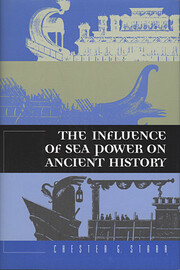

Pulse en una miniatura para ir a Google Books.
|
Cargando... The Influence of Sea Power on Ancient Historypor Chester G. Starr
 Ninguno Actualmente no hay Conversaciones sobre este libro. Ninguna reseña sin reseñas | añadir una reseña
In the 19th-century classic, The influence of sea power upon history, Alfred Thayer Mahan argued the paramount importance of naval superiority in peace and war. This work is still considered definitive today, but as the author points out in this volume, Mahan's theories have led to serious distortions in the way historians interpret the role of naval power in antiquity. Trade by sea was always important in providing raw materials as well as luxuries, but only rarely was it protected by an established navy. As the author reveals, two nations that did protect their trade routes--Athens and Carthage--both fell after long duels with land-based forces, Sparta and Rome. And though Rome went on to create the most perfected and widely based naval structure in antiquity, when Rome fell it was due to invasions by land, not by sea. The author describes major naval battles in detail, and he examines technological developments as they help to illuminate the limitations of galleys in warfare. Ranging from the Bronze Age to the fall of the Roman Empire, this study provides an important corrective to Mahan's thesis, both as applied to ancient history and to modern strategic thinking. No se han encontrado descripciones de biblioteca. |
Debates activosNingunoCubiertas populares
 Google Books — Cargando... Google Books — Cargando...GénerosSistema Decimal Melvil (DDC)909.09822History and Geography History World history Other Geographic Classifications Other Classifications Ocean And Sea Basins MediterraneanClasificación de la Biblioteca del CongresoValoraciónPromedio: (3.13) (3.13)
¿Eres tú?Conviértete en un Autor de LibraryThing. |
||||||||||||||||||||||||||||||||||||||||||||||||||||||||||||||||||||||||||||||||||||||||||||||||||||||||||||||||||||||||